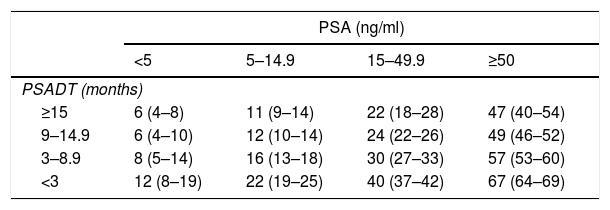In castration-resistant prostate cancer (CRPC), early detection of metastases is essential for the selection of treatment, and prevention of bone complications. However detecting incipient metastases remains a challenge as the conventional radiological tests (bone scintigraphy or computerised tomography) lack sufficient sensitivity. Diagnostic imaging techniques are currently available that have greater sensitivity and specificity, but are little used due to shortfalls in the recommendations.
ObjectiveTo create an algorithm that indicates the most suitable diagnostic imaging techniques for the different M0 CRPC patient profiles based on the scientific evidence.
Evidence acquisitionMeetings were held with eight experts in Urology, Pathological Anatomy, Radiodiagnostics and Nuclear Medicine organised by the Andalusian Association of Urology, in which the recommendations and scientific evidence on each of the diagnostic imaging techniques were reviewed.
Summary of the evidenceWe present the current recommendations for the detection of metastasis in M0 CRPC patients, the patients that would benefit from early detection, and summarise the evidence to support the use of each of the new techniques.
ConclusionsTechniques such as 18F-Choline PET/CT or DWWB MRI and probably open MRI have been demonstrated to have good sensitivity and specificity for patients with low PSA (<10ng/ml). Their inclusion in routine clinical practice will help improve the early detection of metastasis in CRPC patients.
En el cáncer de próstata resistente a la castración (CPRC), la detección precoz de las metástasis es fundamental para la selección del tratamiento y la prevención de complicaciones óseas. Sin embargo, la detección de metástasis incipientes sigue siendo un reto dado que las pruebas radiológicas convencionales (gammagrafía ósea o tomografía computarizada) no tienen suficiente sensibilidad. Actualmente se dispone de técnicas diagnósticas por la imagen con mayor sensibilidad y especificidad cuya implantación es sin embargo escasa, debido a discrepancias en las recomendaciones.
ObjetivoElaborar un algoritmo que indique las técnicas diagnósticas por la imagen más idóneas para diferentes perfiles de pacientes con CPRC M0 según la evidencia científica.
Adquisición de la evidenciaReuniones de 8 expertos en Urología, Anatomía Patológica, Radiodiagnóstico y Medicina Nuclear organizadas por la Asociación Andaluza de Urología en las que se revisaron las recomendaciones y la evidencia científica acerca de cada una de las técnicas diagnósticas por la imagen.
Síntesis de la evidenciaSe presentan las recomendaciones actuales para la detección de metástasis en pacientes con CPRC M0, los pacientes que se beneficiarían de una detección precoz y se resume la evidencia que apoya el uso de cada una de las nuevas técnicas.
ConclusionesTécnicas como la PET/TC 18F-colina o la RMCC/D y probablemente la RMA han demostrado tener una buena sensibilidad y especificidad en pacientes con PSA bajo (<10ng/ml). Su incorporación en la práctica clínica habitual contribuirá a mejorar la detección precoz de metástasis en pacientes con CPRC.








